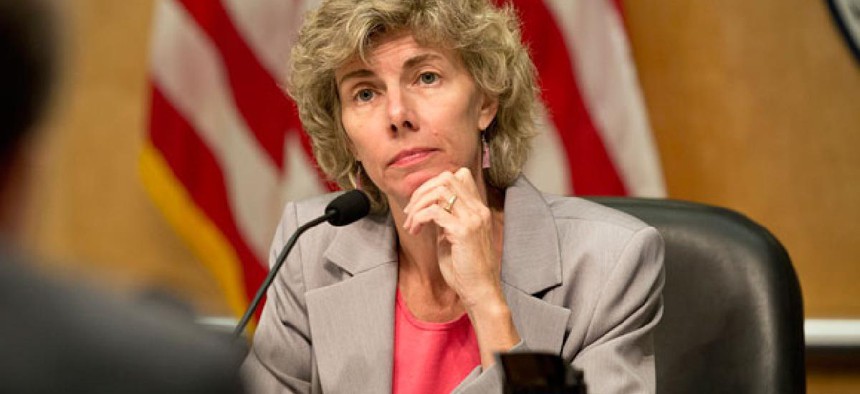
Allison Macfarlane Nuclear Regulatory Commission
NRC chief says agency prioritized lessons from Japan disaster
Macfarlane calls U.S. response more thoughtful than that after Three Mile Island accident.
In one of her first wide-ranging interviews since
Allison Macfarlane, who came over from George Mason University to become the first geologist to lead NRC, said during an interview at the Center for American Progress that the meltdown of three plants in Fukushima and the release of radiation were a “wake-up call” for other countries and the nuclear industry.
But unlike the U.S. response in 1979 after the near-meltdown of the Pennsylvania nuclear plant at Three Mile Island, Macfarlane said, NRC -- acting before her arrival -- issued a report that assigned clear priorities to the preventive steps that regulators will require of American nuclear licensees.
NRC “said let’s make sure a Fukushima event doesn’t happen again. But before we jump on recommendations, let’s think about Three Mile Island, where lots of changes were made wholesale without a broader plan. Some were useful, some not so useful. So let’s take a breath before jump in hand and feet,” Macfarlane said.
As a result, the agency is completing work on the first of three tiers of reforms for better preparations for a nuclear power blackout, Macfarlane said. They include requiring more backup power generators on- and off-site; better venting of boiling water reactors to allow the escape of gasses; better temperature-measuring instrumentation on spent-fuel pools, and more detailed emergency communications and staffing plans.
“Energy is the issue of the 21st century-- how we get it, what we do with it and how it affects the environment,” Macfarlane said. “If we plan badly, we will be in big trouble as a country -- look at Japan, which lost 30 percent of its electricity supply.”
With 104 U.S. nuclear plants in operation -- and four more under construction in South Carolina and Georgia -- nuclear facilities produce 20 percent of U.S. electricity, she noted. The biggest cost factor is construction, not fuel or maintenance, which is why the Energy Department is working with the industry on loans for new plants.
“Regulations don’t come about overnight,” she told moderator Carol Browner, former head of the Environmental Protection Agency. “But it’s essential to have a strong regulator and enforcer of those regulations. We get public input, and we work with our licensees so they know what’s coming and have opportunity for input.”
Among her chief policy concerns are the impact that climate change can have on nuclear plant safety and a coming shortage of nuclear engineers in countries such as Germany that are phasing out nuclear power. There is great interest, she added, in “small, modular” nuclear plants that are built underground for greater safety.
Macfarlane described the governing structure of the five-member NRC, noting there are two Republican appointees and two Democratic ones, plus a chairperson picked by the president. The commission must have a quorum of three to take a majority rule decision. As a “collegial body,” the members, who have different areas of expertise, vote “notationally,” meaning on paper and in public before they do any debating, in compliance with sunshine laws. After reviewing the written votes, they meet for another round and rework the majority’s position into language for their final decision.
NRC’s staff of 4,000, largely made up of nuclear and mechanical engineers, is adequate in size, Macfarlane said, noting after the Japan disaster, staff were moved into a special directorate to deal with it. Each nuclear plant is covered by two inspectors, working out of one of four regional offices. “We rotate them every seven years because, to borrow a term from anthropology, we don’t want inspectors going native,” she said. They’re not allowed to eat or fraternize with the licensee, and they take an oath to fulfill the safety mission. Macfarlane said her biggest surprise was observing how dedicated staffers are to their mission. “The NRC works hard to make sure the inspectors are happy and have what they need,” she added. “That’s why it is rated a top agency to work at.”
Macfarlane also said she is impressed by NRC’s “attention to growing people, rotating them to different parts and providing leadership development. They are attentive to the careers of people.” The workforce is aging, she acknowledged, but “we have a pretty strong program to bring people in at the entry level and shape them.”







